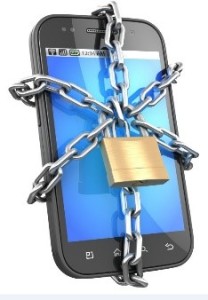Mobile Device Security
The ability to access the internet has rapidly evolved with the release of smart phone s and tablets. While the widespread adoption of these devices has greatly improved convenience and productivity, it has also provided another source for personal information to be lost or stolen.
s and tablets. While the widespread adoption of these devices has greatly improved convenience and productivity, it has also provided another source for personal information to be lost or stolen.
Security Apps
The threat of viruses attacking home computers and laptops is widely known, but much less focus is placed on this same danger for mobile devices. Browsing the internet on a computer without an anti-virus program would be perilous; the same mindset must be applied for tablets and phones connecting to the internet. A mobile security application with the ability to scan, detect, and prevent malicious software or attacks is essential for any device. These are free mobile security apps, available for both iOS and Android, which have consistently been the highest-rated:
The free versions of these security applications also allow the user to locate a lost or stolen device, lock that device so no one may access it, or set off an alarm from the device to attract attention. Paid versions of these apps contain additional features, including remotely wiping the device, setting up a geo-fencing perimeter, or taking a picture from the device’s camera remotely.
Backing Up Device
Along with taking security precautions against theft or attack, it is best to prepare for the unpredictable by backing up data. If a device is lost, stolen, or broken, having a reliable backup of the data makes the replacement process considerably less stressful. A mobile device can always be replaced; but, without a backup, the information stored on it cannot. For iOS devices, the preferred method is to back data up to the associated iCloud account. For Android, the same feature is available with the Gmail account on the device. Another option is to plug the device into a computer and either create a backup with iTunes (iOS) or manually copy the data folders onto the computer. But, most importantly, to know that there is a reliable backup and to periodically test that it is functioning properly. If unsure how the device is backing up, visit a service provider store or call the company IT department. The worst time to find out there is not a backup is when it is needed.
Storing Information
In the event of a theft, a passcode will not always keep someone out of a mobile device. At this point, any information that is saved within the browsers or apps is now in the hands of the new device owner. This could include usernames, passwords, photos, messages, notes, emails, and financial or personal data. The best preventative measure is to never store critical information within browsers or apps. If making a purchase from an app, log out when finished and do not save the login information. While it may seem inconvenient to have to re-enter a login when using the app, it is far better than taking the risk of having the data stolen.
Device Maintenance
User maintenance of any mobile device is important. Every app is susceptible to attack if a vulnerability is discovered. For this reason, it is recommended to regularly review the applications installed and delete any that are no longer used or needed. Updating apps and device software when prompted is also a necessary security measure. These updates can provide patches to known vulnerabilities, which can prevent hacking attempts on the device from succeeding.
While it is impossible to predict and prevent every scenario that could occur for a mobile device, taking precautions and preventative security steps can greatly reduce the risk of theft, attack, and data loss.
With proper planning, teamwork and execution, your business can become more secure against cyber threats. RKL eSolutions has an information technology team ready to help clients in a wide range of industries implement network and information systems infrastructure with an eye to security and accuracy. Contact RKL eSolutions today to find out how they can help your business tackle its IT challenges.



